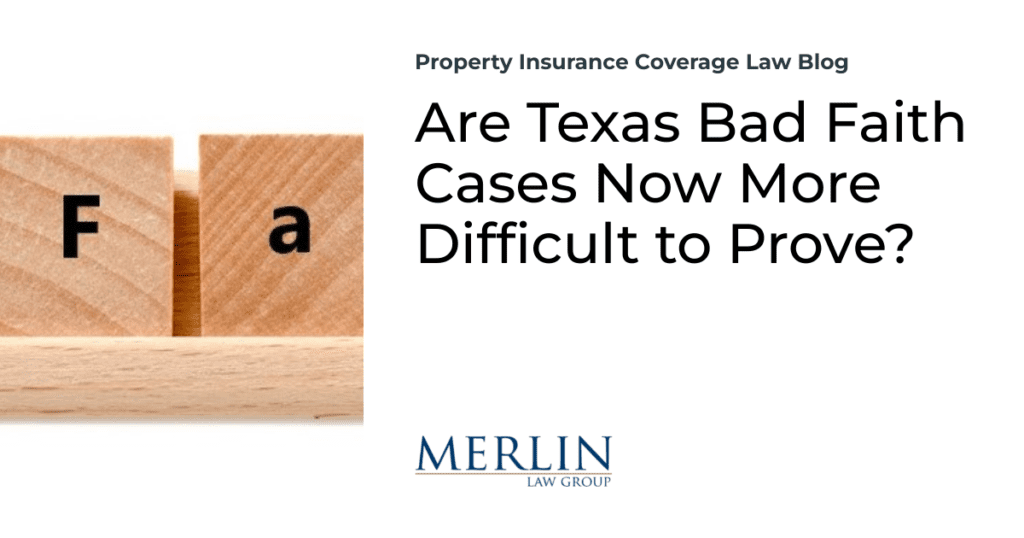Are Texas Bad Faith Cases Now More Difficult to Prove?

A ruling yesterday by a federal judge in Texas1 seems to indicate a trend where federal courts will prevent bad faith claims from going before a jury if the insurer has an expert opinion supporting the denial of a claim. The court dismissed the bad faith portion of the lawsuit with the following rationale:
To succeed on a bad-faith claim, the insured must establish that there was no reasonable basis for the insurer to deny payment of the claim and that the insurer knew, or should have known, that there was no reasonable basis for such denial….
Here, plaintiff has not produced evidence to create a triable issue on whether insurer Church Mutual’s conduct was unreasonable following the April 2020 hail storm. The unrebutted evidence in the summary-judgment record shows the following: After the hail storm and plaintiff’s claim, Church Mutual retained a public adjuster, Robert Bullard. Based on Bullard’s investigation, Church Mutual concluded that the claim required payment of $62,028.73 in covered damages. When plaintiff retained its own public adjuster and represented that it was entitled to $1,171,672.85 on the claim, Church Mutual sought additional opinions from engineers Ian Ray and Justin Donaldson. Those additional experts pointed to causes of loss not covered by the policy. Their findings constituted at least a reasonable basis—even if it ultimately proves to be unpersuasive to the factfinder in this case—for the insurer to deny plaintiff’s demand for a higher payment amount.
Plaintiff cites cases such as Universe Life Ins. Co. v. Giles, 950 S.W.2d 48, 56 n.5 (Tex. 1997) to argue that ‘an insurer cannot manufacture a bona fide coverage dispute by conducting an unreasonable investigation . . . to shield itself from bad faith liability.’ But those are not the facts or reasonable conclusions that could be drawn from the facts in the summary-judgment record here. It is undisputed that Church Mutual sent at least three experts to investigate the storm damage. Plaintiff brings no evidence that those investigations were biased or pretextual. And the court concludes that the experts’ qualifications and assignments do not support an inference of bad faith or unreasonableness, even if the factfinder might ultimately disagree with their conclusions.
Proving a pre-textual investigation or biased investigation is not easy. I noted this in The Plague of Wrong and Insurer Worded Engineering Reports by Insurance Company Retained Engineers:
Many skeptical public adjusters, contractors, and critics tell me that they do not have to wait to know what the engineering report is going to say if a certain engineer has been retained. Not only are the scientific findings adverse to the policyholder, but the wording of the report also inextricably dovetails with the insurer’s exclusionary or limiting policy language. It is much easier to prove that an engineering report’s conclusion is wrong than it is to prove that the errors and wrong conclusions were the result of bias or an outcome-oriented state of mind.
Texas insurance company attorneys will simply remove the matter to federal court and then make certain they can check the box to see if they have an acceptable expert opinion to provide the excuse to dismiss bad faith allegations. I am certain this will be a topic of conversation at the American Policyholder Association (APA) meeting, which starts today in Dallas.
The APA has a special complaint portal set up for sham fraudulent engineering reports. Keeping track of and doing something about this plague of engineers who are part of the claim process is a mission of the APA.
Thought For The Day
Character cannot be developed in ease and quiet. Only through experience of trial and suffering can the soul be strengthened, vision cleared, ambition inspired, and success achieved.
—Helen Keller
1 Pollard Memorial United Methodist Church v. Church Mut. Ins. Co., No. 6:22-cv-00158 (E.D. Tex. Oct. 31, 2023).



